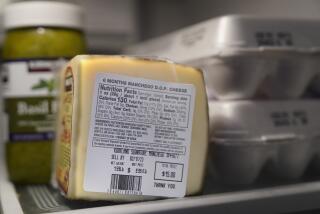Food Safety: a New Marketing Weapon : From cleansers to turkeys, producers are touting new methods that help get the bacteria out
- Share via
A distinct marketing phenomena has emerged in food magazine ads and package labeling the past few years. Producers of everything from cleansers to fresh turkey now tout their products’ ability to prevent, destroy or minimize harmful bacteria.
One industry trade magazine calls food safety among the hottest trends in product introductions this year.
Some of the most aggressive claims come from makers of products familiar to every home.
Clorox Co., maker of bleach, has been running full-page ads in food magazines since 1994. One recent ad states, “Stopping salmonella and E. coli from ruining a good meal takes more than just soap and water. It takes Clorox Bleach.”
Another familiar brand pushing a food safety theme is Reckitt & Coleman Inc.’s Lysol. The latest expansion of the cleanser line came in May, when the company introduced Lysol Antibacterial Kitchen Cleaner. Promotional material states that the new Lysol “allows the consumer to eliminate the grease and grime they can see as well as kill the microscopic germs that you can’t see--such as salmonella and E. coli.”
The Lysol and Clorox promotions, however, go further than the federal government in describing the tenacity of certain food-borne bacteria. All food safety advisories from the U.S. Department of Agriculture and Food and Drug Administration clearly state that hot water and soap are sufficient to disinfect surfaces that come in contact with salmonella and E. coli.
Other food safety-themed products are the result of new technologies.
Turkey producer Shady Brook Farms of Harrisonburg, Va., has been heavily promoting its use of Assur-Rinse--a Rhone-Poulenc Food Ingredients trademark--designed to rid carcasses of potentially harmful bacteria in the processing plants. Shady Brook turkeys carry a tear-drop logo with a large “A” in the center indicating that Assur-Rinse has been applied. The birds are showered with food-grade trisodium phosphate, also used in cheese and cereal production, at a critical stage of turkey processing. Application of Assur-Rinse reduces the rate of salmonella present on carcasses to less than 1% from levels as high as 25% to 45%.
Widespread usage of Assur-Rinse by the nation’s major poultry producers, however, is stalled. The food industry, to a great degree, believes that there is no need to alert consumers to potential contamination problems that might not be a conscious concern. Trisodium phosphate rinses have been approved by the U.S. Department of Agriculture as effective in reducing surface bacteria on poultry and beef. But rinses are only an option; industry observers say they will not gain widespread acceptance until the USDA requires their use in slaughter and processing plants.
Another product that has run into similar opposition is Procter & Gamble’s Fit Produce Rinse. Still in test markets, Fit is a consumer product that can be used to remove surface wax, dirt, bacteria and chemical residues on produce. Fit’s ingredients are biodegradable and include baking soda and citric acid.
*
But Fit has already been criticized in a major produce industry trade journal. According to Produce Business magazine, “Procter & Gamble’s new produce rinse is receiving less than a lukewarm reception from produce industry members who contend that it is an unnecessary product that plays upon--and may inflame--unfounded fears about the safety of fruit fruits and vegetables.”
Although Fit is the latest in a fairly long line of produce rinses, it is the first to be manufactured by a major household products company that could easily weather slow initial sales.
The first wave of the latest food safety-themed advertising began in 1988 and was also directed at fresh produce. Local supermarket chains reacted quickly in the aftermath of the Alar-in-apples controversy and began laboratory testing best-selling produce items for pesticide residues. The results, if no farm chemical were detected, were then announced in a full-page ads and on posters in the produce counter. Such “no detectable residues” advertisements are infrequent now.
Organic produce and other organically processed foods also cashed in on the public’s fear of synthetic chemical residues, antibiotics and other animal drugs. However, as the organic industry has evolved, its promoters state that the appeal of their products is beyond food safety. Organic foods, they say, appeal to consumers because they address environmental issues in terms of land and water usage, they are produced in a fashion that reduces risk to field workers and they offer superior taste and freshness. The market for organic foods is estimated to be $1.5 billion to $2.3 billion a year.
Some of the strongest language used to market food safety is found in regional advertising.
Fresh Fields markets, serving the Washington, D.C., area, recently ran a local newspaper ad critical of traditional yellow-skinned chicken under the heading, “Here’s an eye opener: real chicken isn’t supposed to be yellow.” The ad, according to Supermarket News, continued: “Commercially produced birds are usually raised on a diet of treated feed, coloring agents and antibiotics to maximize yields. The chicken we sell [Bell & Evans brand] is white, plump, lean and succulent with an excellent flavor unlike any you’ve tried before.”
In Southern California, Mrs. Gooch’s Whole Food Markets also recently advertised the availability of fresh turkeys without “fillers, chemicals or preservatives.” The eight-store chain also promoted sales of frozen organic turkey.
Possibly the most helpful supermarket food safety promotion occurred in the Kansas City area in September. The Price Chopper chain distributed 50,000 free refrigerator thermometers, a simple device that plays a key role in assuring that cold foods are kept at the proper temperature.
More to Read
Eat your way across L.A.
Get our weekly Tasting Notes newsletter for reviews, news and more.
You may occasionally receive promotional content from the Los Angeles Times.










